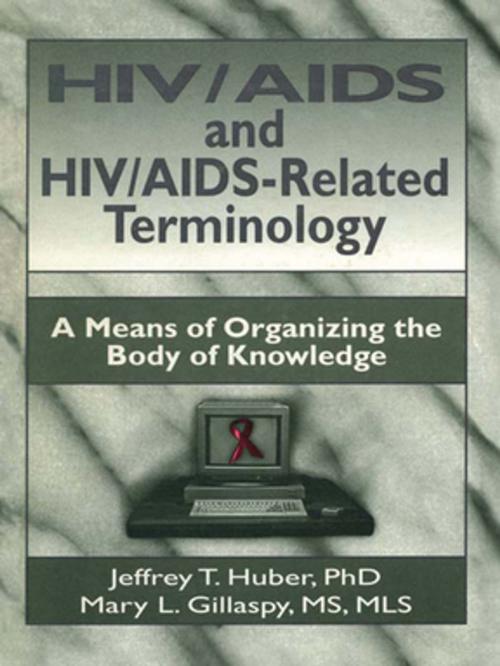HIV/AIDS and HIV/AIDS-Related Terminology
A Means of Organizing the Body of Knowledge
Nonfiction, Health & Well Being, Health, Ailments & Diseases, AIDs & HIV, Reference & Language, Language Arts, Library & Information Services, Medical| Author: | M Sandra Wood, Jeffrey T Huber, Mary L Gillaspy | ISBN: | 9781317950967 |
| Publisher: | Taylor and Francis | Publication: | October 18, 2013 |
| Imprint: | Routledge | Language: | English |
| Author: | M Sandra Wood, Jeffrey T Huber, Mary L Gillaspy |
| ISBN: | 9781317950967 |
| Publisher: | Taylor and Francis |
| Publication: | October 18, 2013 |
| Imprint: | Routledge |
| Language: | English |
HIV/AIDS and HIV/AIDS-Related Terminology: A Means of Organizing the Body of Knowledge offers an adaptable and extensive framework for organizing the ever-expanding number of resources on the HIV/AIDS epidemic. It lays down the groundwork upon which future blocks of information can be placed. As new information becomes available, it can be integrated into this system without rearranging the information already stored. This saves the time and money associated with revising a less flexible existing system. The book’s instructions for use and taxonomic classification system make it easy to use.
HIV/AIDS and HIV/AIDS-Related Terminology is designed for use in any setting where HIV/AIDS healthcare or information services are provided. It acts as a guide to available resources and illustrates how to acquire the most up-to-date information. At the same time, it moves beyond the more general focus on the clinical, legal, and medical ramifications of HIV/AIDS to the development of an interdisciplinary cataloging system that includes all issues and topics associated with the disease. This invaluable reference tool leaves no rock unturned. It addresses every conceivable facet of the epidemic, from the psychological to the religious and from the economic to the social.
Any organizations or institutions concerned with the collection, creation, management, and dissemination of HIV/AIDS-related materials will find this book an essential for their libraries. Practical and comprehensive, HIV/AIDS and HIV/AIDS-Related Terminology addresses a full range of topics, including:
-
prevention and education
-
epidemiology and transmission
-
treatment
-
funding opportunities
-
health policy
-
HIV/AIDS and the fine arts
HIV/AIDS and HIV/AIDS-Related Terminology is the first book to provide a method for grappling with the vast scope of information on the HIV/AIDS epidemic. Its organic structure is designed to accommodate new knowledge as it becomes available, while it maximizes access to existing information in a variety of formats.
HIV/AIDS and HIV/AIDS-Related Terminology: A Means of Organizing the Body of Knowledge offers an adaptable and extensive framework for organizing the ever-expanding number of resources on the HIV/AIDS epidemic. It lays down the groundwork upon which future blocks of information can be placed. As new information becomes available, it can be integrated into this system without rearranging the information already stored. This saves the time and money associated with revising a less flexible existing system. The book’s instructions for use and taxonomic classification system make it easy to use.
HIV/AIDS and HIV/AIDS-Related Terminology is designed for use in any setting where HIV/AIDS healthcare or information services are provided. It acts as a guide to available resources and illustrates how to acquire the most up-to-date information. At the same time, it moves beyond the more general focus on the clinical, legal, and medical ramifications of HIV/AIDS to the development of an interdisciplinary cataloging system that includes all issues and topics associated with the disease. This invaluable reference tool leaves no rock unturned. It addresses every conceivable facet of the epidemic, from the psychological to the religious and from the economic to the social.
Any organizations or institutions concerned with the collection, creation, management, and dissemination of HIV/AIDS-related materials will find this book an essential for their libraries. Practical and comprehensive, HIV/AIDS and HIV/AIDS-Related Terminology addresses a full range of topics, including:
-
prevention and education
-
epidemiology and transmission
-
treatment
-
funding opportunities
-
health policy
-
HIV/AIDS and the fine arts
HIV/AIDS and HIV/AIDS-Related Terminology is the first book to provide a method for grappling with the vast scope of information on the HIV/AIDS epidemic. Its organic structure is designed to accommodate new knowledge as it becomes available, while it maximizes access to existing information in a variety of formats.















